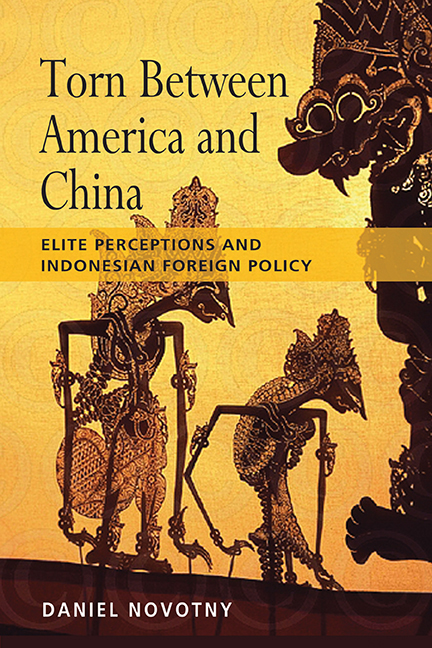Book contents
- Frontmatter
- Dedication
- Contents
- Foreword
- Preface
- List of Figures
- Acknowledgements
- PART I THE CONTEXT
- PART II THE PERCEPTIONS “ANTARA DUA KARANG”
- PART III ELITE CONSENSUS AND POLICY OUTCOMES
- 6 The Bigger Picture: Elite Perceptions of Other Powers
- 7 The Indonesian Elite Facing a Changing World
- 8 Conclusion
- Glossary
- Abbreviations
- Bibliography
- Index
- Note on the Author
6 - The Bigger Picture: Elite Perceptions of Other Powers
from PART III - ELITE CONSENSUS AND POLICY OUTCOMES
Published online by Cambridge University Press: 21 October 2015
- Frontmatter
- Dedication
- Contents
- Foreword
- Preface
- List of Figures
- Acknowledgements
- PART I THE CONTEXT
- PART II THE PERCEPTIONS “ANTARA DUA KARANG”
- PART III ELITE CONSENSUS AND POLICY OUTCOMES
- 6 The Bigger Picture: Elite Perceptions of Other Powers
- 7 The Indonesian Elite Facing a Changing World
- 8 Conclusion
- Glossary
- Abbreviations
- Bibliography
- Index
- Note on the Author
Summary
INTRODUCTION
This chapter is concerned with the Indonesian elite's perceptions of other important regional and extraterritorial state actors, namely Australia, Japan, India and the ASEAN countries. The preceding two chapters both analysed separately, and also juxtaposed, the elite perceptions of the United States and China in the context of the “mendayung antara dua karang” thesis — this signifies the Indonesian elite's belief that, in the future, the island nation will increasingly have to “row between two reefs”. In other words, much like in the bipolar Cold War era, Indonesia will have to manoeuvre between two rival superpowers — the United States and China, both of whom have proven to be of the highest concern to the interviewed members of the Indonesian foreign policy elite.
However, we will argue in this chapter that, when compared with the Cold War era, the elite is more confident in Indonesia's ability to successfully “navigate” between the “two reefs”. The confidence arises from the leaders’ belief that the future state and nature of international relations will allow Indonesia to decrease its perceived excessive political and economic dependence on the West in general and the United States in particular. Because, as a former President asserted,
as to the United States, we depend heavily on it, on imports, on international trade, on everything including the United Nations, which is so much influenced by the United States. … [But] we don't want to be dependent too much on the Europeans and the United States. … You want to lessen your own costs by creating more competition.
As we have found, the current process of China's ascendancy is welcome in Jakarta insofar as it helps Indonesia to eliminate negative implications of the perceived assertive and unilateralist policies of the United States. Yet, the discussion on China also highlighted the elite's continuing deep-rooted suspicions and uneasiness about Beijing's perceived expansionist aspirations. These perceptions, it was argued, will in the future induce the Indonesian leaders to implement a hedging strategy to eliminate any potential threat by China to their country's national interests and security.
- Type
- Chapter
- Information
- Torn between America and ChinaElite Perceptions and Indonesian Foreign Policy, pp. 247 - 298Publisher: ISEAS–Yusof Ishak InstitutePrint publication year: 2010

